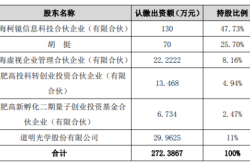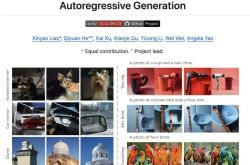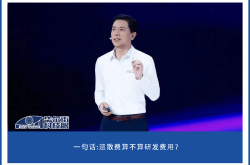AI Job Postings Surge 29-Fold on Maimai: Who's Aggressively Boosting Investments?
![]() 08/22 2025
08/22 2025
![]() 532
532
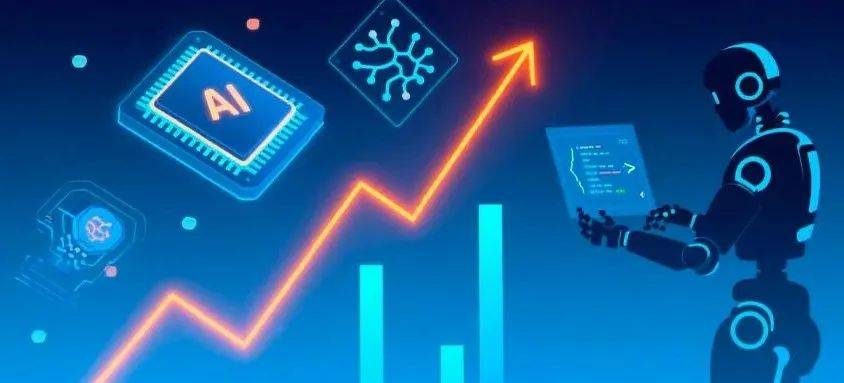
Produced by | Entrepreneurship Frontline
Art Editor | Xing Jing
Reviewed by | Song Wen
More than half of 2025 has elapsed, and amidst the technological battleground, an intense talent war is also unfolding in the AI market. Musk, Zuckerberg, and Google founder Brin have personally stepped in to compete for top talent, each pushing harder and more competitively than the other.
From international to domestic markets, from giants to startups, and from technical leaders and core members to industry newcomers, fierce "battles" for large model talent are taking place.
Recently, Maimai released data showing that in July 2025, the number of new AI job postings on Maimai surged by over 10 times compared to the same period last year and skyrocketed 29 times compared to January 2024. Over 1,000 AI enterprises are recruiting talent on the platform, with over 72,000 related job postings. The average monthly salary for AI-related positions ranges from 47,000 to 78,000 yuan, with some AI interns earning a daily salary of 4,000 yuan.
It's evident that AI has become a must-win territory for all players, and AI talent has emerged as a core asset that enterprises must fiercely compete for.
1. AI Companies Scramble for Talent in an Unprecedented Spectacle
"Entrepreneurship Frontline" discovered that AI research and development positions at major companies generally offer salary packages around one million yuan per year, and some even provide AI interns with "sky-high" daily salaries of 4,000 to 5,000 yuan. One practitioner warned that these are publicly available data in job postings, and many highly paid positions do not specify salaries in the postings but require face-to-face discussions with candidates.
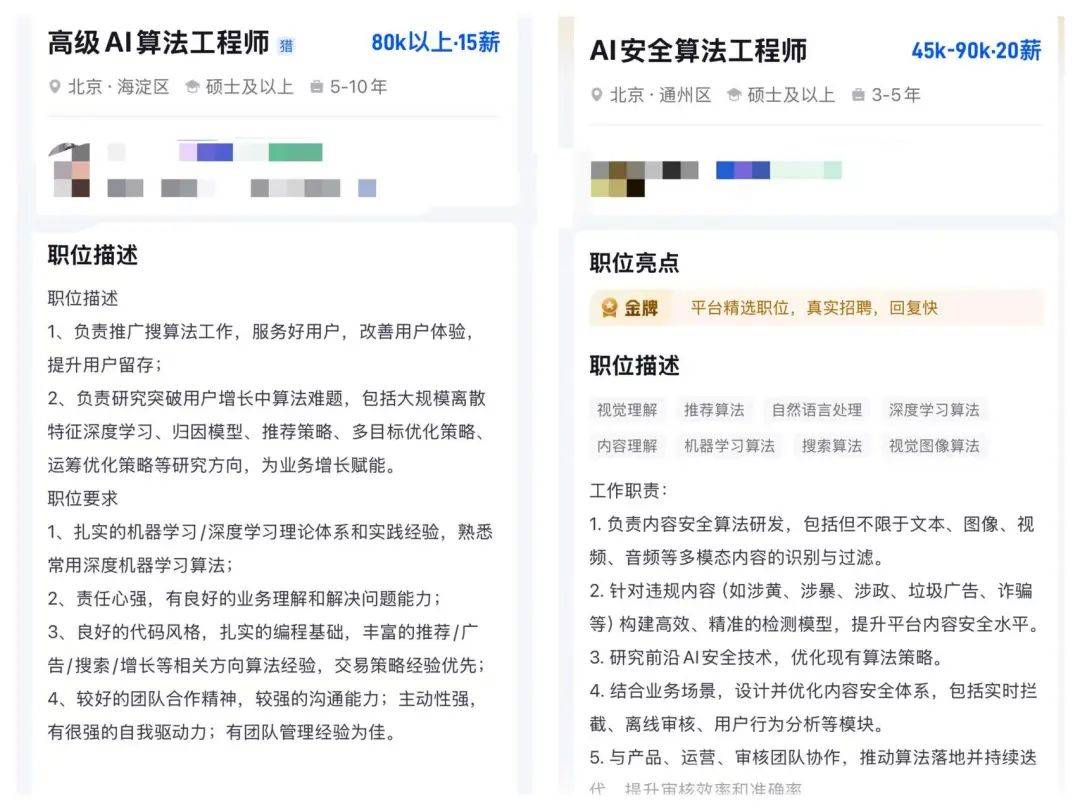
(Image / Screenshot from Maimai's job posting page)
Salary is just one of the basics to get to the table. The explosion of technology and business has made AI talent more active. Maimai also disclosed a compelling statistic: As of July 2025, 41.07% of employees at leading domestic AI companies have intentions to job hop, with their job-seeking status as "looking for opportunities," far exceeding the 14.65% in the internet industry.
From the demand side, various enterprises urgently need AI to find new growth poles, such as the internet, new energy vehicles, intelligent driving, robotics, e-commerce, games, and new lifestyle service industries.
Among them, the most notable are major companies, all of which are trying to find new business growth points through AI. For example, half of Alibaba's newly released 2026 spring recruitment positions are for AI talent; Tencent aims to promote AI applications "silently" through platforms like WeChat; Baidu's 2026 campus recruitment has over 90% AI positions; ByteDance is attacking multiple AI applications and earlier announced that it would invest $20 billion in 2025 to advance AI infrastructure construction. It's evident that major companies are holding resources and waiting for talent to explode.
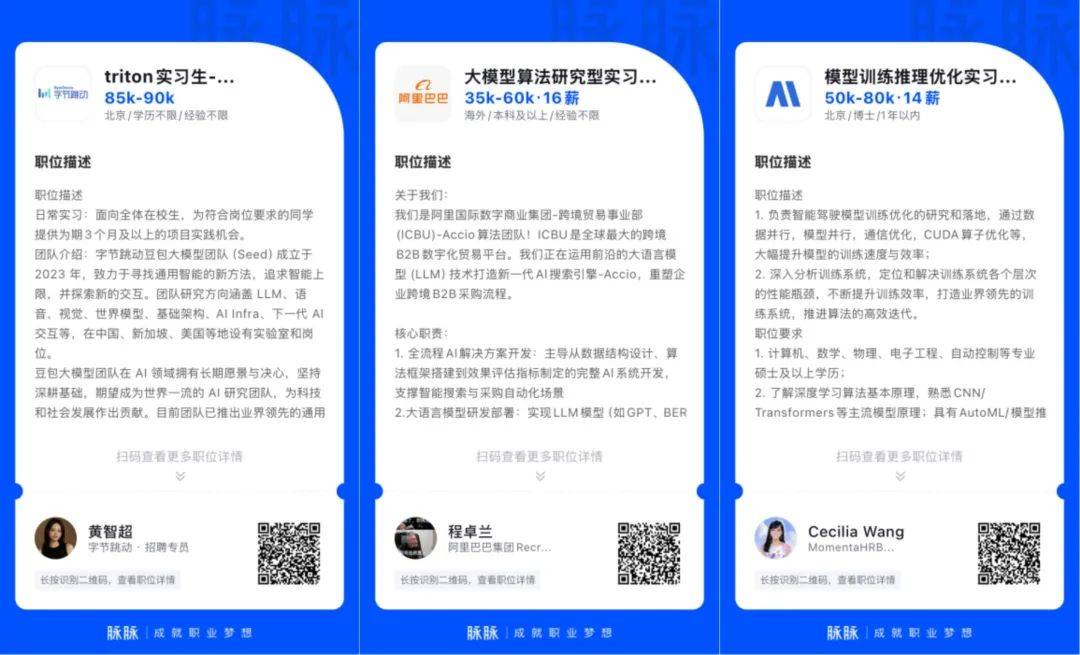
(Image / Screenshot from Maimai's job posting page)
From the supply side, there is a "shortage" of AI talent for both campus and social recruitment.
Each year, a top domestic institution graduates only a few hundred AI technical talents, many of whom lack business experience. The social recruitment side also sees several positions competing for one talent. This is because enterprises' demand for AI talent is no longer just about "writing code"; for example, embodied intelligence algorithm engineers require software and hardware integration abilities; AI architects must not only understand technology but also predict business needs for the next three years, otherwise, the system will face iteration soon after launch; creating intelligent agents requires a systematic understanding of the business...
As a result, AI talent is experiencing a situation where "high salaries but difficult to recruit." Many business leaders of AI companies have expressed similar recruitment strategies to "Entrepreneurship Frontline": as soon as they see or are recommended suitable talent, they will try to arrange a "face-to-face" meeting, hoping to strike first.
2. AI Talent Rediscovers the "Golden Age"
It's not difficult to see from the observations of "Entrepreneurship Frontline" that the current atmosphere in the AI circle "resembles" the "golden age" of the internet around 2008 - technological innovation explosion, surging job opportunities, and relatively simple workplace relationships.
However, there are clear differences between the "talent scramble" in the AI circle today and the internet's "talent scramble" over a decade ago.
First, executives personally get involved in recruitment. In the past, it might have been a single-line connection, but now AI executives are directly "advertising" themselves. "Entrepreneurship Frontline" found that some have directly changed their signatures on Maimai, such as an executive from DeepSeek whose signature is "seeking resumes," even updating it minute by minute to "seek resumes":
In the AI circle, HR recruitment often leads to candidates being misdirected due to "technical ambiguity." However, the leading forces and business leaders in the AI circle are mostly from the early internet giants' product and research elites. Many of them are seed users and core groups of Maimai, and they directly enter community discussions to recruit talent, greatly accelerating the speed and pace of the AI circle's "talent scramble".
Second, the decision-making process for talent is also different from that of the past.
Now, salary is just a hard threshold. When choosing AI companies and positions, job seekers no longer only consider salary and business development prospects like in the internet era but also consider factors such as who the technical leader is, the team's technological breakthrough capabilities, and personal skill enhancement. For example, there are numerous posts on Maimai asking about business, technology, industry, market, and job prospects. Everyone "communicates on an equal footing," without the aggressive pressure from HRBP during interviews and without the need to be cautious about every word.
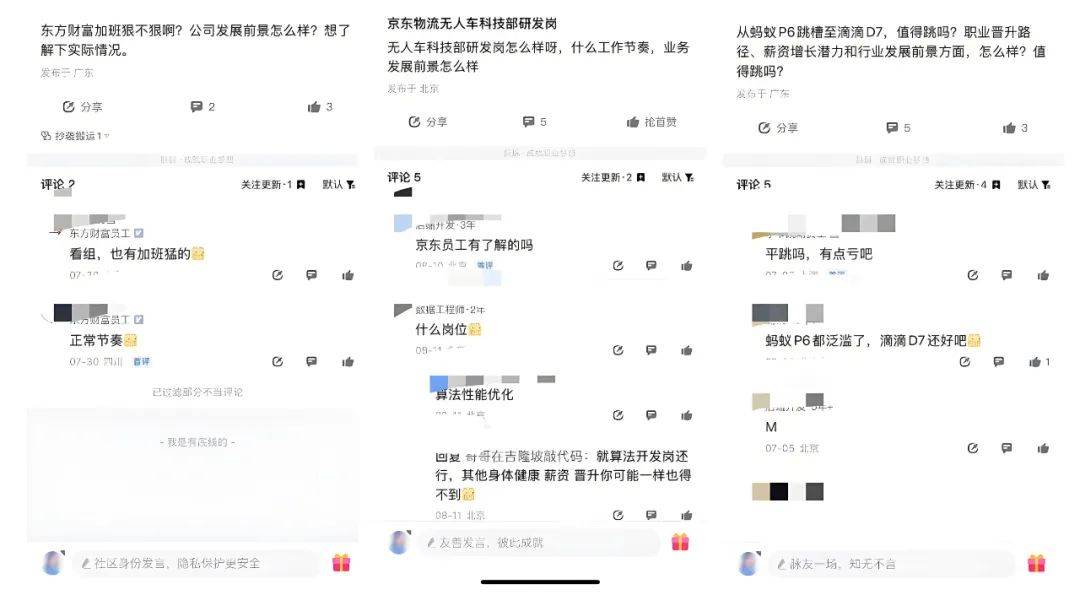
There are even many VCs "lurking" in the circle, precisely connecting with AI industry entrepreneurs. These guided atmospheres make "short-term salary increases" less important when AI talent makes decisions, leading the AI industry into a more benign career development cycle.
Finally, this round of AI talent scramble is not exclusive to technical talent; the demand for non-technical positions is also evident. Among them, product managers, HRBPs, brand managers, operation managers, financial managers, marketing, and other non-technical positions are also seeing a surge in opportunities. MiniMax's HR is "recruiting AI large model sales around the clock and everywhere," and AI companies need PR managers and investment managers during financing. Many non-technical position holders have found that after updating their AI project experience, the traffic to their personal profiles usually increases significantly.
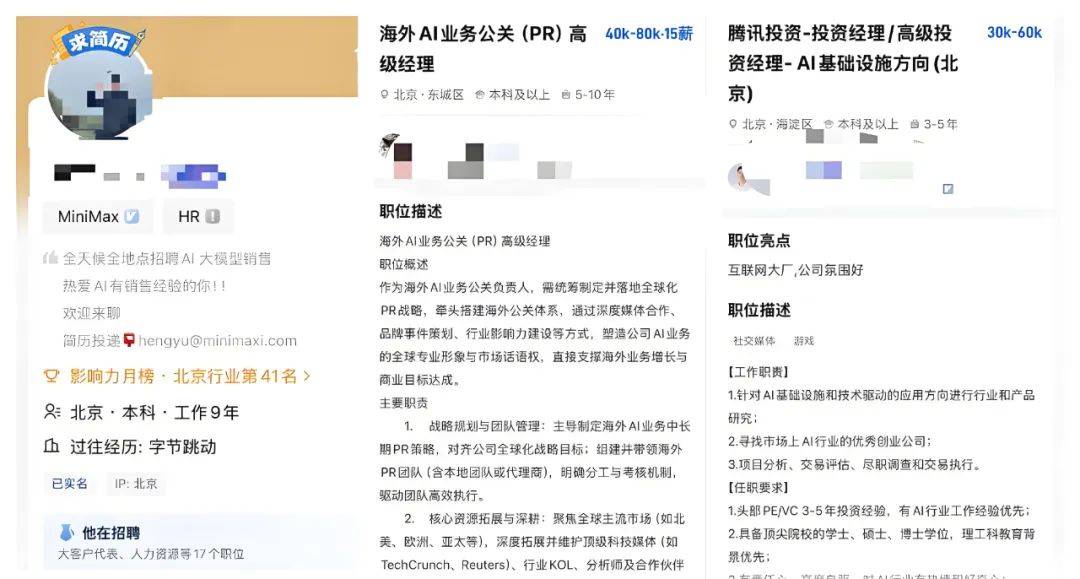
3. In the AI Era, Talent Focuses on "Trust Endorsements" in the Circle
"Entrepreneurship Frontline" also noticed a distinct feature in the AI field ecosystem: trust costs are placed at an extremely high position, and many people are accustomed to obtaining first-hand information from small circles when looking for jobs and assessing career prospects.
For example, one of the most popular posts on Maimai is offer comparison posts, where experienced seniors or employees of target companies provide valuable advice to job seekers. They provide detailed answers, taking into account job levels, platform differences, and more.
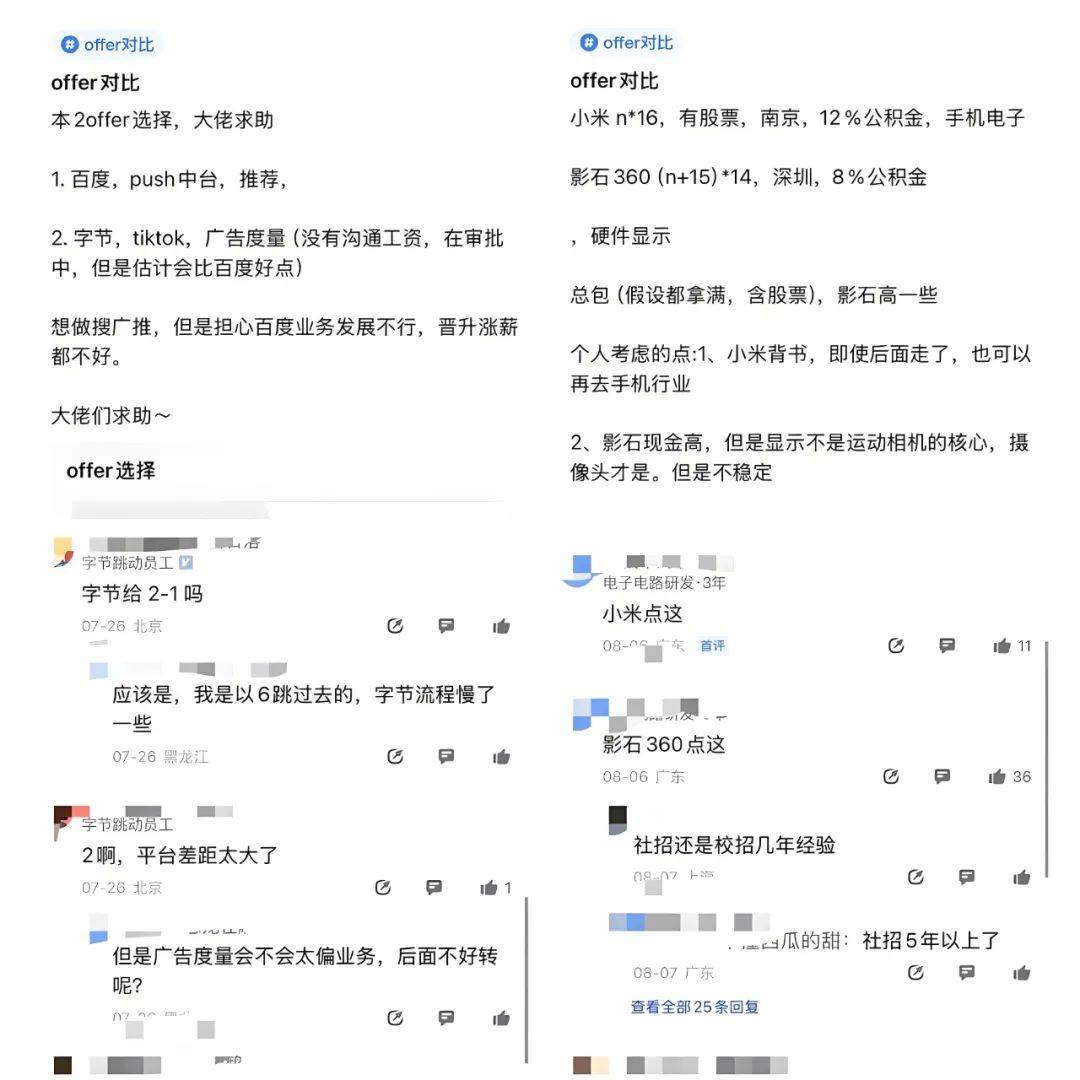
Some offer comparison posts can even be precise about whether the team leader is good, the atmosphere, the strictness of attendance, whether work-life balance (wlb) can be achieved, and whether the year-end bonus can be fully received. These questions might be difficult to directly ask in an interview but can be seen in real workplace evaluations in the community, allowing job seekers to make fully informed decisions.
This has also changed the dynamic of "companies unilaterally conducting background checks on talent," giving talent more opportunities for "reverse background checks on companies." An AI industry job seeker told "Entrepreneurship Frontline" that last year, he wanted to move from Beijing to Hangzhou for work and life. He used Maimai's "connections" to conduct a detailed "reverse background check" on all the companies offering him positions and ultimately found a relatively satisfactory company, greatly reducing decision-making risks.
This is because on Maimai, there are 120,000 AI talents active in various industry circles, colleague circles, and alumni circles. In colleague circles, many people reach out to former colleagues after leaving, and some even objectively revise former colleagues' performance reviews when they are unfairly treated, "helping when needed."
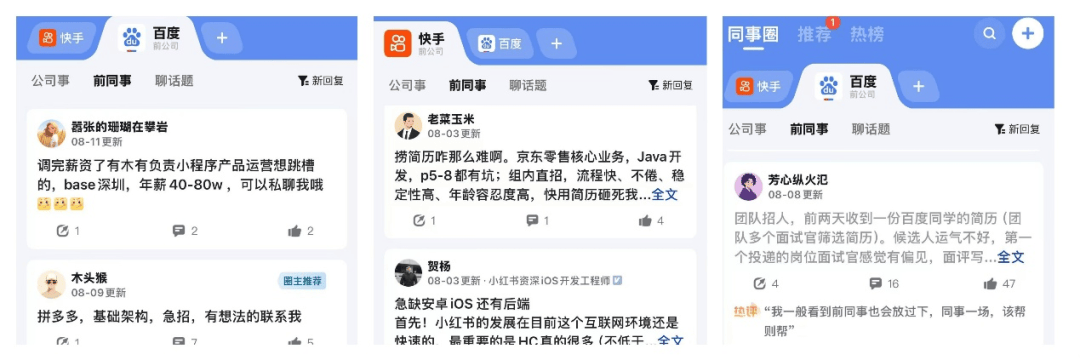
A P10 (director level) from an internet company told "Entrepreneurship Frontline" that two reliable subordinates in his team were "brushed up" on Maimai. Before going to bed, he browses posts in various circles and directly chats and recruits them when he sees their unusual sensitivity to technical paths.
For "working people," community discussions based on trust endorsements are not only in-depth technical exchanges but also "frontier information radars" for industry pulses.
Such as industry dynamics like the VP of HAOMO.AI jumping ship, Alibaba's Duo Long resigning, and Kuaishou's Zhang Di resigning. Working people can speak freely, capturing the undercurrents beneath official announcements, thereby sensing changes in the wind direction earlier than others, helping themselves to more comprehensively understand company movements and industry logic and avoiding becoming "information islands." They can also observe the tracks of top talents, review others' pitfalls and lessons, and glimpse uncompiled career paths. These genuine shares are more valuable than successful motivational chicken soup.
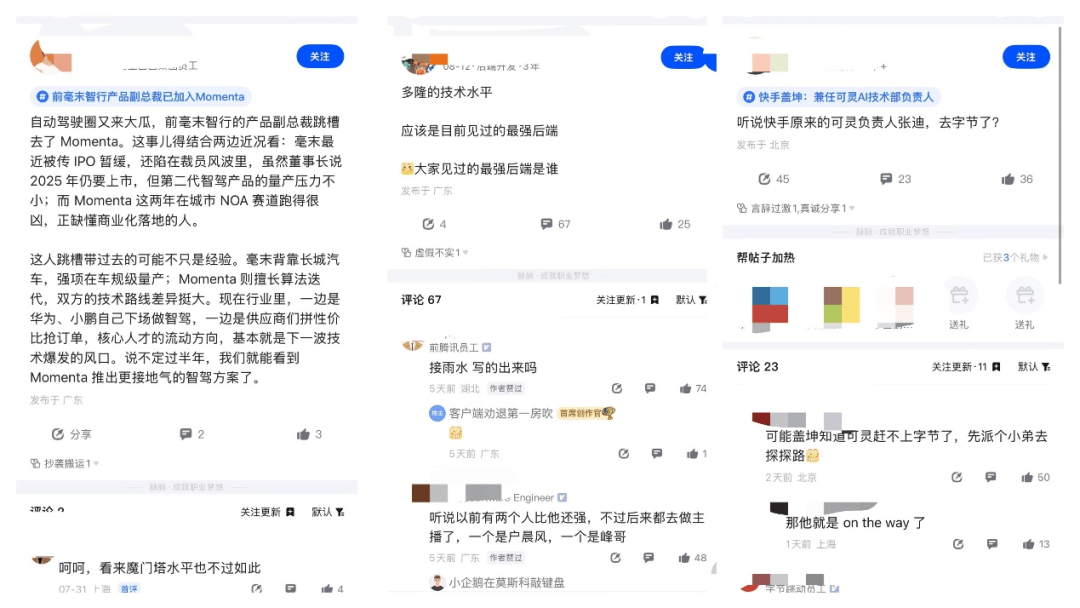
Most importantly, when looking for a job in the AI era, one must also learn to "break out of the circle." For example, in the Maimai AMA (Ask Me Anything) section, there are many questions and answers about companies' last days. Outsiders who want to change jobs and fresh graduates looking for work actively ask questions here. Outsiders bypass official propaganda and packaging, achieving true "elimination of information asymmetry" and making choices that better match their development.
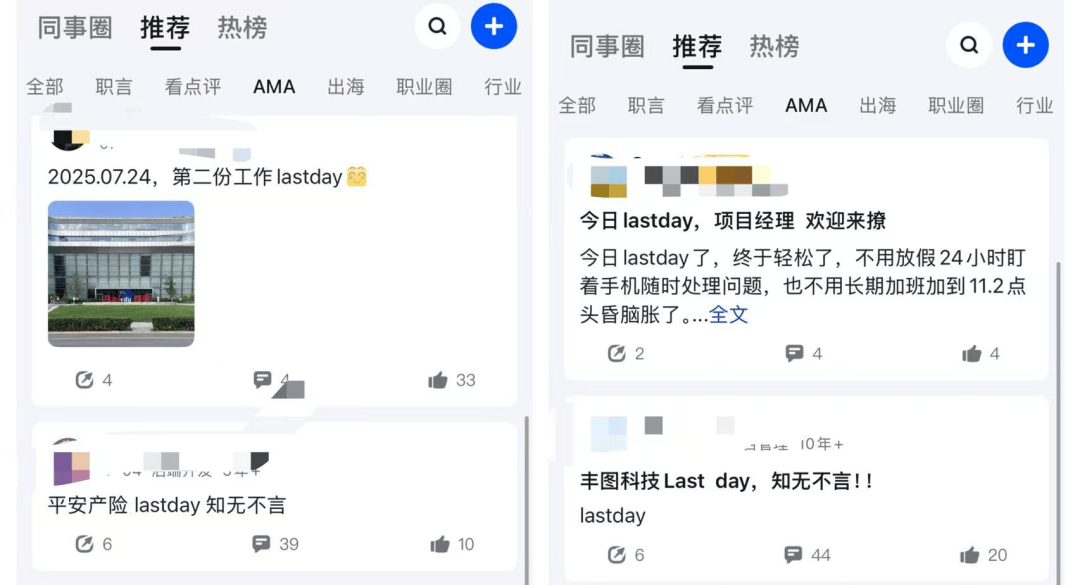
An HRBP from a robotics company told "Entrepreneurship Frontline" that browsing other circles more often may lead to more opportunities. "Two years ago, our company recruited a high school physics teacher who met our CEO under a Maimai post discussing embodied intelligence. This former teacher, now a hardware engineer, has seen his annual salary increase eightfold."
4. Written at the End
For AI talent, Maimai is not just a platform for "finding jobs and chatting about the workplace" but also an intelligent navigator for personal career development. It provides far more valuable benefits than money: authentic company evaluations, transparent salary returns, and cutting-edge industry insights - helping make every career choice wiser and more solid.
For enterprises, in today's difficult search for AI talent, Maimai is even more of a treasure trove, directly reaching and attracting high-potential quality talent.
In this talent war where "those who get talent win the world," Maimai is gradually becoming a key link connecting talent with opportunities, personal growth, and organizational development.
*Note: The lead image in the article is AI-generated.


